Khmer Youth Development Centre
'Start children off on the way they should go and even when they are old they will not turn from it.' Proverbs 22:6
In October 2016 our Cambodia team were offered the use of a 2 hectare property including a 60m long multi-purpose building that was originally used as a dormitory for students attending the adjacent Samdach Ov High School. In its heyday the compound had played a significant role in shaping the lives of many young students from surrounding villages, yet was now completely overgrown and left to ruin.
The Partners Against Poverty Board was asked to help resurrect the ministry but doing so would mean raising teams of volunteer workers and around $70,000. In January 2017 a five year lease was signed with the Samdach Ov High School and funds for the project were raised in both Australia and Cambodia. Towards the end of January 2017 the Warnbro Community Church sent a team of volunteers to kick start renovations and together with the Cambodian team and a host of local volunteers, the entire facility was transformed in time to accomodate students for the final school semester of 2017.
Since that time many lives have been transformed. From shy village kids with little hope for their future other than a sweat shop or worse, to School Teacher, Economist, Midwife, Nurse, Business graduate, Mechanic, IT graduate, Pastor, Ministry worker, Accountant, Telecommunications Engineer, Electrician and more, all future leaders in their communities and churches.
At KYDC every students has daily chores, set study periods, times for Bible study and non-compulsory worship. Male and female dorm parents act as big brother and sister, mentoring and tutoring the students as they work through their senior school education. Most students spend 5 and a half days each week at the dorm, returning home at the weekend to see family and friends.
Each student is challenged to envision a better future, they are exposed to previously unknown opportunities and encouraged to set life goals. Once their dreams are concieved they're shown how they might realise them and supported through every phase of their journey. The KYDC program also offers limited university and higher education scholarships which carry an open invitation to attend the Narrow Gate House in Phnom Penh.
KYDC has developed a reputation amongst local students and teachers as a safe haven and a place of care and learning. More than just accommodation, KYDC students attend english language classes which help them get higher paid jobs after school, and youth programs that provide peer support, mentorship, and a space to find hope. With 1000+ high school kids on our doorstep, we have a unique opportunity to share the Gospel and make an impact on their lives.
In addition, KYDC is an ideal training ground for local Bible school graduates and international missionaries who are eager to begin their ministry but lack the experience and cultural understanding that comes from exposure. We offer a supportive environment for them to mature and grow under the guidance of experienced ministry leaders.
The KYDC operation is overseen by 5 paid staff led by Pastor Jose Estrebilla and his wife Rowena. Their entire focus is the development of the young people in their charge.
In 2025 the Samdach Ov School Board invited our team to establish an ESL program on campus, providing a dedicated classroom and the full support of teaching staff to promote the new initiative amongst the student body. Our team are grateful and excited for the opportunity to improve the language skills of many more students.
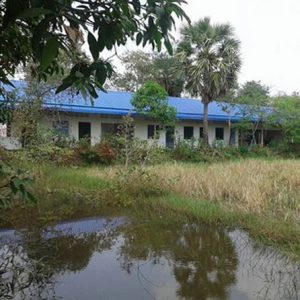

Cambodian Child Development Program
Jesus said, "Let the little children come to me, and do not hinder them, for the Kingdom of Heaven belongs to such as these." Matthew 19:13-14
As families strive to meet the ever-increasing cost of living it is common for both parents to work long hours, often travelling long distances to factories, leaving children in the care of elderly grandparents, neighbours or to fend for themselves. In an attempt to provide relief for carers and create a safe place for children, village Church members have established pre-school programs in their church buildings - a safe place where children can begin to learn, grow and play.
In 2014, having identified a lack of structure, engaging curiculum and teaching skills amongst these small programs, our Cambodian team set about creating a ministry to develop culturally relevant, scripture based teaching materials, along with a training program for the lay teachers tasked with delivering programs.
Since then our team have produced highly regarded materials, published training manuals and trained over 200 teachers in the use of the "Beloved Child" series - a 12 month, scripture based, teaching resource for pre-school aged children.
The Beloved Child course is designed to address the unique needs of local children within the loving arms of Jesus. The curriculum stresses the basic value of each child as created in the image and likeness of God, redeemed from sin by the blood of Jesus, and needed by God to actively take part in building His kingdom in their family and community.
Through participation in their local churches, children will learn:
• Biblical principles and mindsets concerning their God-given value and dignity
• Virtues that will help shape their character for life, as beloved of God, their family and community
• Basic spiritual disciplines toward healthy and fruitful Christian life and witness
• Christ-like character traits that will prepare them toward becoming honourable and Godly citizens.
In addition to planting and supporting pre-schools in local communities, the CCD program has established church-based student coaching clinics for primary students to improve their English language, maths and Khmer language skills. To graduate year 12, Cambodian students must pass year 12 English because most higher education providers teach from English language text books. Rural schools lack the skill to teach English at the level required, meaning country kids are behind the eight ball when it comes to competing with city kids for university placements.
Once established, these pre-schools and coaching clinics can become fully self funded through a modest user pays fee structure. Partners Against Poverty provide class room buildings or extensions to existing buildings, resources and teacher training. CCDP staff provide ongoing face to face support, teacher training, curriculum updates and new materials.
In 2025 the CCDP staff will be involved in establishing a dedicated classroom at Samdach Ov High School and providing on the job training for prospective teachers to run the new ESL Program.
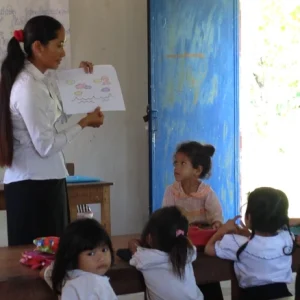
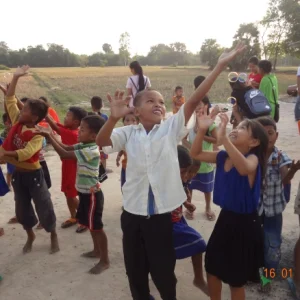
Timothy Program
'Preach the word, be prepared in season and out of season; correct, rebuke and encourage.' 2 Timothy 4:2
In 2015 the Church in Takeo faced disarray. Through a series of unfortunate disruptions many had stopped meeting together, buildings were abandoned, and those who remained were discouraged and floundering. Under the leadership of Pastor Jose Estrebilla a new program was designed to train, encourage and mentor church leaders. Over the following three years 30 pastors and their leadership teams were impacted, their churches re-opened, and childrens ministry workers recruited and trained.
Today the Timothy Program continues to equip rural Church leaders with the attitudes, habits and skills they need to be agents of transformational and sustainable change in their local Church and community.
Initial training is a 12-month program focusing on personal growth, pastoral care and community development initiatives. Following initial training leaders come together for monthly development meetings with a focus on supporting those struggling financially by establishing community based income producing initiatives.
During the Covid epidemic this network of provincial Church leaders reached out to thousands of village families providing strategies for Covid risk reduction, face masks, anti-bacterial products and emergency food supplies.
In 2025 the Timothy Program continues to support these frontline Gospel workers by building into their ministries. This involves meeting and worshiping together, praying for each other, training support staff, and combining resources to meet specific needs within their churches and their communities.
'Therefore encourage one another and build each other up just as you have been doing.' 1 Thessalonians 5:11
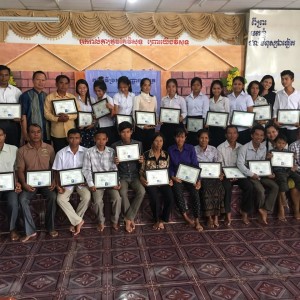
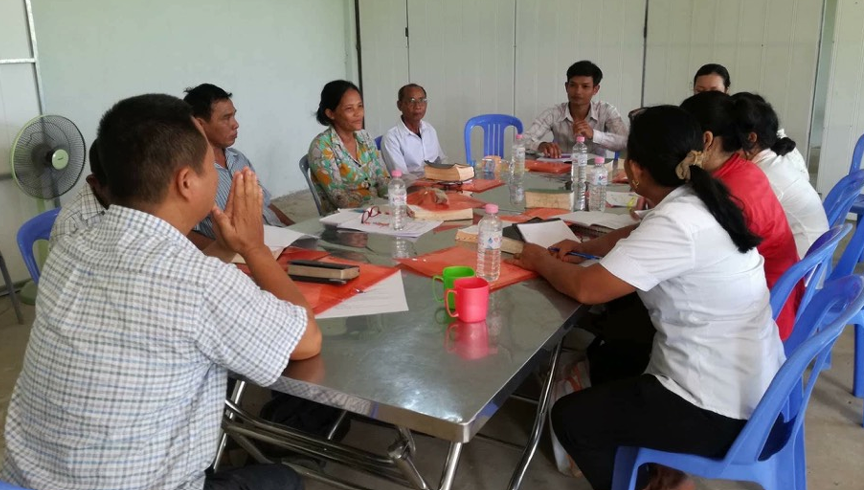
Narrow Gate House
Jesus said, "Enter through the narrow gate. For wide is the gate and broad is the road that leads to destruction, and many enter through it. But small is the gate and narrow the road that leads to life, and only a few find it". Matthew 7:13-14
Narrow Gate House in the city of Phnom Penh is a safe home-away-from-home where university or bible college students are supported through the daunting task of leaving their families and villages, and can focus on their studies without the distractions of daily survival. Mentors help with study skills and provide guidance as students navigate the challenges of city and university life.
Residents run their own program under the leadership of Pastor Jose and Rowena Estrebilla, encouraging each other to form, hold on to and pursue their life goals, and challenging each other to become the ministry and secular leaders of the future.
The dormitory provides accomodation for up to 20 residents and is funded by Partners Against Poverty, Takeo Province Churches and the residents themselves.
2025 will see us continuing our ministry to residents students as well as rolling out a campus evangelism program and establishing an in-house Church at Narrow Gate House.
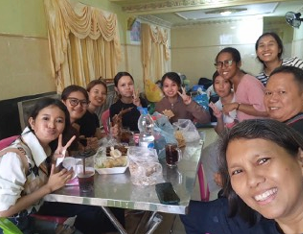
Drug Awareness and Intervention Program
Drug abuse is a devastating reality in Cambodia. In response, Partners Against Poverty has created a life-changing program to educate and empower high school students in their fight to overcome drug and alcohol abuse. The half-day seminar features presentations from experts in the field, including law enforcement, school officials, and those who have personally battled addiction. Students participate in interactive sessions designed to equip them with the tools they need to resist peer pressure and other influences that can lead to drug and alcohol abuse. This crucial program follows the evidence-based guidelines of the Unitied Nations Office of Drugs and Crime. Together we can turn the tide against drug abuse and give young people the bright future they deserve.